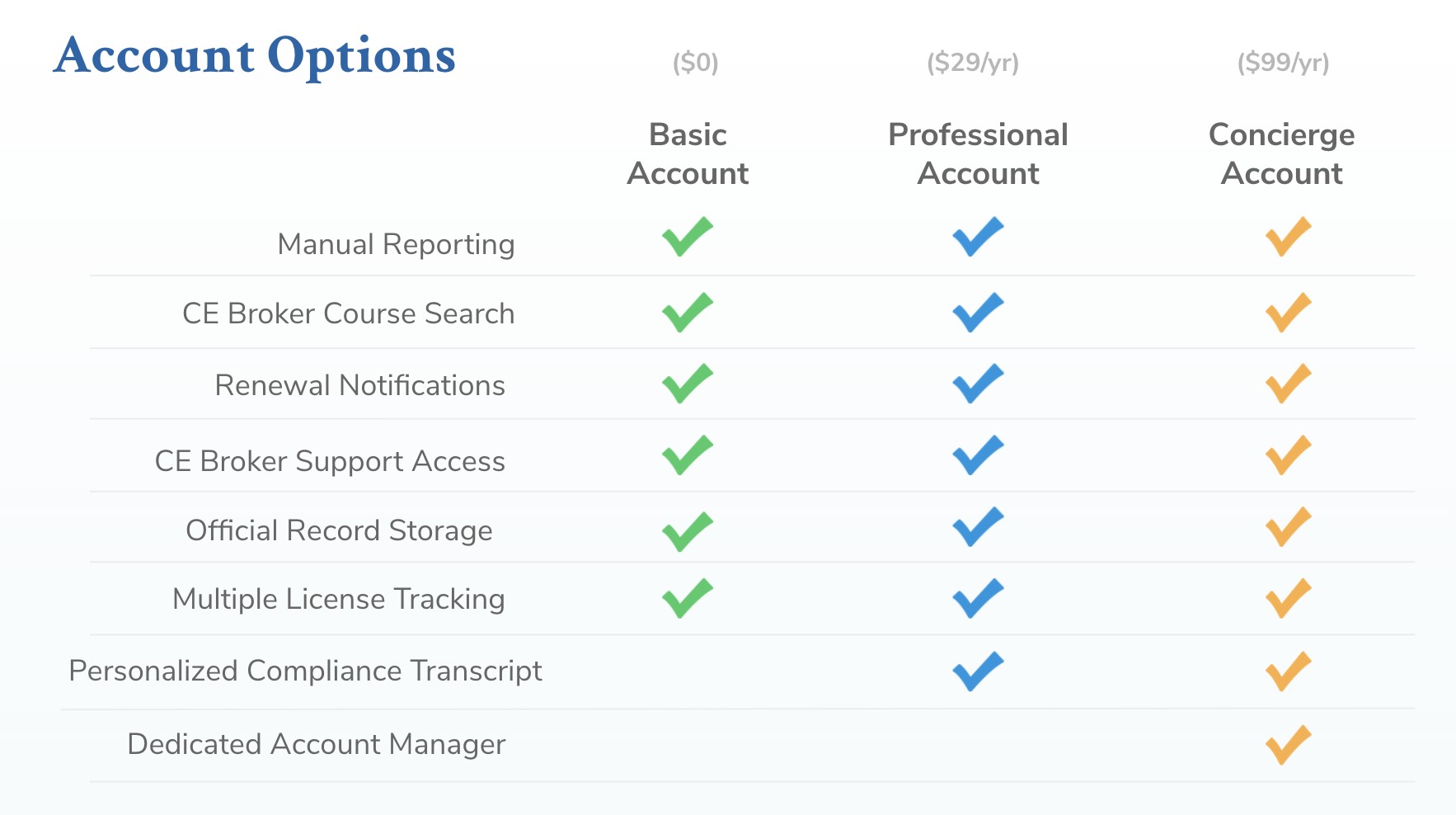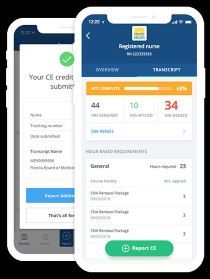Board of Dentistry Continuing Education
The Tennessee Board of Dentistry Partners with CE Broker
At this time, it is not required that licensees register for an account but the board is encouraging licensees utilize this is a tool to assist in the tracking of the required continuing education. The Board is providing this service to licensees at no cost. CE Broker also has a course search available so licensees can search for courses they can complete to be in compliance with the continuing education requirements.
CE Broker is the official CE/CME tracking system of the Tennessee Board of Dentistry. The Board has provided you with a free Basic Account, so you have their helpful education tracking tools right at your fingertips.
Free Access
CE BROKER IS 100% FREE TO USE. You will never have to pay for a CE Broker Basic Account. Licensees do have the option to subscribe to an upgraded account, which offers additional CE tracking tools outlined below.

HOW TO ACTIVATE YOUR FREE CE BROKER ACCOUNT?
1. Visit www.cebroker.com/tn/plans
2. Select the Basic Account option
3. Enter your license number and get started tracking your continuing education!
If you already have a CE Broker account, follow these simple steps to add your Tennessee license.
Comprehensive Course Search
The CE Broker Course Search helps you find every course you need to complete your license renewal. Any Courses with the “Take it Here” tag will be instantly reported to your account and appear in your Course History. To find courses, visit courses.cebroker.com/search/tn and select your profession.
Helpful Support Center
CE Broker provides dedicated support 8AM-8PM ET Monday - Friday with a team of experts trained on the rules and regulations of the Tennessee Board of Dentistry. You can reach them by phone at 877-434-6323 or via email and live chat.
FAQs
Visit the CE Broker FAQ directly for detailed information on CE Broker and how to use your free account.

PRO TIP: Bring CE compliance wherever you go with the CE Broker mobile app. Available on iPhone and Android from the App Store or Google Play.
Continuing Education Requirements
Failure to comply with continuing education requirements may result in disciplinary action against the licensee or registrant. The disciplinary action will be reported on the Department of Health license verification web site.
For policies pertaining to continuing education, please click here.
Dentists are all required to fulfill 40 hours of continuing education during the two calendar year cycle (January 1 of an odd year - December 31 of an even year) and keep a current C.P.R. card at all times. A minimum of 2 of the required 40 biennial hours must be obtained in the area of prescribing of controlled substances education which includes instruction in the TN Chronic Pain Guidelines. Dentists who hold a Limited Conscious Sedation, Comprehensive Conscious Sedation or Deep Sedation/General Anesthesia permit must also complete a minimum of 4 hours of the required 40 biennial hours in the subject of sedation and/or anesthesia. Permit holders must also maintain current ACLS certification (PALS can be substituted if a pediatric dentist).
Dental hygienists are all required to fulfill 30 hours of continuing education during the two calendar year cycle (January 1 of an odd year - December 31 of an even year) and keep a current C.P.R. card at all times. A minimum of 2 of the required 30 biennial hours must be obtained in the area of chemical dependency education. Beginning January 1, 2011, dental hygienists can obtain no more than 50% of their continuing education via online or web-based. This requirement does not apply to dentists and registered dental assistants. Beginning July 1, 2022, a live interactive webinar is to be considered in-person continuing education. This amendment to the statute defines a "live interactive webinar" as an internet based broadcast in which viewers may interact with a presenter in real time.
All registered dental assistants are all required to fulfill 24 hours of continuing education during the two calendar year cycle (January 1 of an odd year - December 31 of an even year) and keep a current C.P.R. card at all times. A minimum of 2 of the required 24 biennial hours must be obtained in the area of chemical dependency education.
According to the Tennessee Board of Dentistry rules, acceptable continuing education is:
- Courses sponsored or approved by any of the following organizations:
- American Dental Association or its constituent or component societies.
- Academy of General Dentistry or a state affiliate.
- American Dental Hygienists’ Association or its constituent or component societies.
- Any national, regional or state academy or association of any of the recognized specialty branches of dentistry listed in T.C.A. § 63-5-112.
- National Dental Association or its constituent or component societies.
- National Dental Hygiene Association
- Capital City Dental Society.
- American Dental Assistants’ Association or its constituent or component societies.
- Tennessee Dental Hygienists Academy of Advance Study.
- Tennessee Department of Health and its affiliated Metropolitan Health Departments
- Tennessee Emergency Management Agency (TEMA)
- Federal Emergency Management Agency (FEMA)
- Educational courses sponsored by an accredited school of dentistry, dental hygiene, or dental assisting. If such course is taken for or assigned quarter or semester credit hours, three semester hours or equivalent quarter hours shall be equivalent to fifteen continuing education hours. No credits will be counted for courses failed.
- Five (5) hours of continuing education credit shall be granted for attendance at a state, regional or national dental meeting. A maximum of ten (10) continuing education credits may be earned in this category during the continuing education cycle that precedes the licensure or registration renewal year. These hours are in addition to any continuing education courses attended at any of those meetings.
- Hour-for-hour of continuing education credit will be granted for courses in Advanced (ACLS) or Pediatric (PALS) Cardiac Life Support that are taught in accordance with the “Guidelines” of the American Heart Association or the American Red Cross or sponsored by the American Heart Association or the American Red Cross during the continuing education cycle that precedes the licensure or registration renewal year.
- The hours necessary to obtain or maintain C.P.R. may be counted as continuing education hours.
- Twenty (20) hours of continuing education credit will be awarded for authorship of publications relevant to the practice of dentistry (e.g., a book, a chapter of a book, or an article or paper published in a professional peer reviewed journal).
- Four (4) hours of continuing education credit shall be awarded, during each continuing education cycle that precedes the licensure or registration renewal year, to presenters for each hour of an initial presentation of a formal continuing education course that is a didactic and/or a participatory presentation to review or update knowledge of new or existing concepts and techniques. Hour-for-hour credit will be granted for repeat presentations. This category is limited to a maximum of twenty (20) hours continuing education credit during each continuing education cycle that precedes the licensure or registration renewal year.
Cardiopulmonary resuscitation (CPR) is defined as successful completion of a BLS Healthcare Provider course, or CPR/AED for the Professional Rescuer, or an equivalent course, which provides training for healthcare professionals in CPR and the use of an AED. The course must be conducted in person and include a skills examination on a manikin with a certified instructor.
The Dental Board conducts random audits to verify C.P.R. certification and continuing education hours. You must retain these documents for a three-year period.
BEING AUDITED DURING A PARTICULAR YEAR DOES NOT PREVENT YOU FROM BEING AUDITED THE FOLLOWING YEAR.
Proof of continuing education cannot be in the form of personal summary. You must provide a copy of the certificate you were awarded showing the topic, hours awarded, instructor’s name and credentials, date, who approved the continuing education, the time the continuing education started, and the time the continuing education ended.
If your license is active in this state (not in a retired status), whether you practice or not, you are required to have C.P.R. recertification and continuing education. If you retired your practice, but did not retire your license with the state, you are required to maintain current C.P.R. recertification and continuing education.
Requests for waivers of continuing education and/or C.P.R. should comply with the Rules and Regulations of the Tennessee Board of Dentistry (refer to Rule 0460-1-.05(5)). All waivers must be in writing to the Board’s administrative office. As the rule states, waivers must be based on conditions that were beyond the physical capabilities for that individual to obtain C.P.R. and/or continuing education. The Board requests that you have doctor’s statements sent directly to the Board’s office stating the conditions and that it is the opinion of the doctor(s) that you should be allowed a waiver based on those conditions.
Whenever you have a question regarding continuing education, refer to Rule 0460-1-.05 "Continuing Education and C.P.R.," or call the Board’s administrative office and speak to the administrator of the Board.
